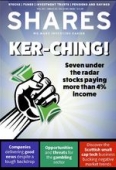Archived article
Please note that tax, investment, pension and ISA rules can change and the information and any views contained in this article may now be inaccurate.
Why oil shares seem unshaken by the windfall tax

Bruce Kovner may not be the best-known hedge fund manager in the world but, as the founder of Caxton Associates, he is one of the most successful.
He gives little away in public, but it is worth tracking down his few pronouncements and one of this column’s favourites is his comment, ‘What I am really looking for is a consensus the market is not confirming.’
Right now, so far as this column can tell, the consensus is that oil prices are going to stay high, because of the war in Ukraine, an assumption that OPEC+ will maintain supply discipline or that oil firms are wary of new drilling projects because of environmental or political pressure.
So concerned is World Bank president David Malpass about oil prices that he is citing the Russian invasion of Ukraine, and its effect upon commodity prices, as a potential cause of a global slowdown, if not an actual recession.
Oil stocks are responding to this environment. Shares in Shell (SHEL) and BP (BP.) are both back to pre-pandemic levels and Shell is nudging toward its prior all-time peaks, even if BP is some way short.
When oil stocks are studied in a wider context, it seems as if investors don’t believe crude will remain in the ascendent for too long, possibly in the view that the long run move away from hydrocarbons to alternative, renewable sources of energy is on track.
Higher price, lower profile
Whether this is a good example of a situation where share prices remain sceptical of what seems like the consensus is something that investors can only decide for themselves.
But managing the transition from oil and gas to wind, solar and others may yet take time.
It is therefore interesting to note that oil stocks still represent only 11.4% of the FTSE All-Share’s market capitalisation, compared to historic highs north of 20%, when oil also traded consistently above $100 a barrel.
Oil stocks also seem to be relatively out of favour in the US, where their profile, as measured by their percentage of the overall stock market’s valuation, is still languishing near historic lows.
In the US, the major oil producers command an aggregate market capitalisation which represents just 2.4% of the S&P 500 index’s total $33 trillion price tag. Granted, that is a big leap from the lows of autumn 2021 but it is barely a quarter of the highs seen in the middle of this millennium’s first decade.
Love and hate
This is in stark contrast to the market’s love affair with technology stocks. The US Information Technology sector did not quite reach its prior peak at around 35% of total S&P 500 market cap this time around.
That may be no bad thing, given how badly that 1998-to-2000 surge came to grief in 2001 to 2003’s bear market, but tech still reached 30% during the pandemic as some investors decided it was the only story in town.
Tech’s loss of favour may feel uncomfortable for many, but its reversal of fortune still looks minor compared to the rout of 20 years ago.
This takes us to another money management legend, Bridgewater’s Ray Dalio, who is less circumspect when it comes to expressing his views publicly than Bruce Kovner.
One pearl from Dalio is this: ‘The biggest mistake that investors make is to believe that what happened in the recent past is likely to persist. They assume that something that was a good investment in the recent past is still a good investment. Typically, high past returns simply imply that an asset has become more expensive and is a poorer, not better, investment.’
The crippling falls in many tech stocks would perhaps lead investors to think the consensus is bearish, just as oil shares’ ongoing resilience, even in the face of the UK’s 25% windfall tax, would give the impression that everyone is bullish on oil stocks.
The historic trends given to these sectors, and their relative weightings now, would suggest that may not be the case. Tech still feels loved; oil still feels reviled. Over to you, Kovner.
Important information:
These articles are provided by Shares magazine which is published by AJ Bell Media, a part of AJ Bell. Shares is not written by AJ Bell.
Shares is provided for your general information and use and is not a personal recommendation to invest. It is not intended to be relied upon by you in making or not making any investment decisions. The investments referred to in these articles will not be suitable for all investors. If in doubt please seek appropriate independent financial advice.
Investors acting on the information in these articles do so at their own risk and AJ Bell Media and its staff do not accept liability for losses suffered by investors as a result of their investment decisions.
Issue contents
Feature
Great Ideas
- FDM is getting set for growth as it sees record levels of activity
- The sell-off in biotech has gone too far, here's how to take advantage
- Why the sell-off at JD Sports is an unmissable buying opportunity
- Another positive update from one of the UK’s best-run firms
- High street icon delivers an impressive set of results all things considered
News
- Find out why market experts think a summer rally could be on the cards
- ANGLE shares surge 58% after gaining US regulatory approval
- Why Authentic Brands is favourite to bag Ted Baker
- A windfall tax shock puts North Sea oil firms on the spot
- Supermarkets are hoping for a bumper Platinum Jubilee spending spree

 magazine
magazine











